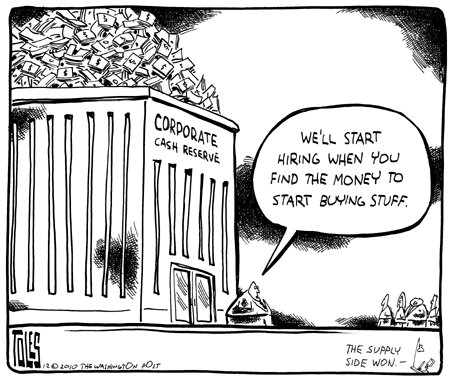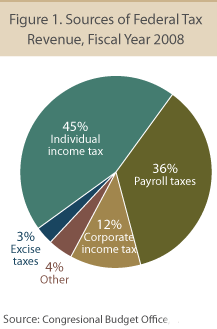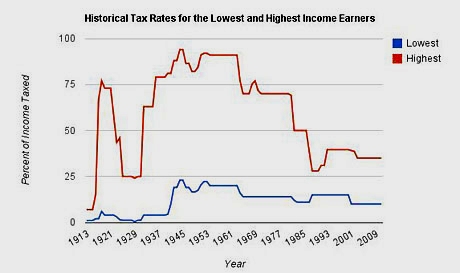|
|
|
Precept #2: Everyone Pays Their Fair Share
Toward the Common Good.
Tax rates are at historic lows. At a time of economic recession, burgeoning budget deficits, and vast inequality of wealth, we need to take a closer look at the revenue side of the budget equation.
For some time now, the budget discussion has been framed by conservatives to be only about spending. But on April 13, 2011, President Obama spoke to the nation about our values, about his deficit reduction plan, and about the need for additional tax revenue. He said, "Everybody pays, but the wealthier have borne a little more.... It’s a basic reflection of our belief that those who’ve benefited most from our way of life can afford to give back a little bit more. Moreover, this belief hasn’t hindered the success of those at the top of the income scale. They continue to do better and better with each passing year."
The newly emergent "Occupy" Movement has changed the debate from austerity and tax cuts to inequality and "the 99%" and taxing the wealthy more heavily.
In his speech at Osawatomie, Kansas, on December 6, 2011, President Obama outlined the 35-year history of the profound redistribution of wealth from the middle class to the wealthy: the automation of many jobs, off-shoring good-paying jobs, the decline of labor unions, and the lowering of tax rates for high-income folks. And he termed our current economic imbalance as, "...the defining issue of our time. This is a make-or-break moment for the middle class, and for all those who are fighting to get into the middle class."
This issue should be at the heart of our budget deliberations and of the 2012 election debates. The plug has been pulled on the middle class. It's been drained of its economic power over the past 35 years. The money is now with the elite few at the top. Government programs are needed just to keep the middle class afloat. This is the justification for bold and significant tax increases on the wealthy, not merely the closing of a few tax loopholes, or even just rescinding the Bush tax cuts.
Trickle-Down Economics
In 2011, non-financial corporations are holding well over $3 trillion in cash reserves, waiting for consumer demand to pick up before they increase hiring to ease the Great Recession. The cartoon to the right offers a graphic illustration: pick up before they increase hiring to ease the Great Recession. The cartoon to the right offers a graphic illustration:
But here is what House Speaker John Boehner said on June 3, 2011, to justify the Republican plan to slash government spending: "We can't raise taxes on the very people who create jobs, and keep spending money that we don't have."
As soon as the subject of raising taxes comes up, the question of impact on the economy arises. Will increasing taxes slow down economic activity? The reverse side of this question is whether cutting taxes will stimulate the economy. This involves the "supply side" or "trickle-down" theory that giving the wealthy more money will cause them to invest more in the economy, thus producing a net increase in tax revenue.
This validity of this theory has been examined and decisively answered, and "trickle down" theory has been thoroughly discredited. For example, both the Reagan and G.W. Bush tax cuts resulted not in economic expansion, but in increased federal budget deficits, which tripled the federal debt under Reagan, and doubled it under Bush.
This question was examined in detail by the authors of Presimetrics, in which they found no correlation between tax rates and economic growth (pages 116-130). In fact, if the last four presidencies are examined on their own, the counter-intuitive conclusion could be drawn that higher tax rates stimulate economic activity (perhaps through increased government spending on needed services).
(An alternative version of this argument is that businesses are not hiring because of uncertainty about governement regulations or uncertainty about future tax rates. Many economists refute this. For example, a recent report on business in Nashville by PBS's Paul Solman in Making Sen$e of Financial News found that it is mainly lack of consumer demand, not regulations or tax rates, that is holding business investment back.)
U. S. Tax Revenue
 |
|
This pie chart shows that individual income taxes and payroll taxes are the source of about 81% of U.S. tax revenue. (A chart showing more detail and including state and local revenue may be found on our 2011 Government Budgets page.)
For useful background, the Tax Policy Center presents a chart and discussion on effective federal tax rates for the range of U.S, income groups for 2008. This chart includes income taxes and payroll taxes. (It should be noted that it also includes business taxes for some tax payers, which inflates the displayed total tax rates for the top 1% income group.)
An even more interesting, detailed breakout in Excel format may be found here. It allows us to remove the business tax influence and see that the top 1% pay about a 19% effective federal tax rate.
And we can then go further and apply those tax rates to the total U.S. individual income for 2010 to derive the dollar amounts
|
involved. These calculations are shown in this Excel chart (or in .pdf format), which shows that the top 1% paid about $450 billion in individual income taxes for 2010 (column highlighted in yellow). If top income tax rates were, say, doubled, an additional $400 billion or so in federal revenue would be realized. And we have the ability to do additional analysis to estimate the effect of raising the tax rates on capital gains and dividends (see below).
The Case for Raising Taxes on the Wealthy
We believe it is entirely appropriate to explore and evaluate increased taxes on the wealthy as a major element of a progressive plan for our economic future. The strategy here is to "free up" the wealth that now lies dormant and idle in the hands of the wealthy (as described here), and recycle it to invigorate the economy and enhance everyone's well being. (We look at the question of property rights and moral righteousness on our Taxation and Property Rights page.)
Here is a chart showing historical federal income tax rates for the lowest and highest income earners. As you can see, the top marginal rate, currently at 35% following the Bush tax cuts, is currently quite low, compared to historical top rates, which have been over 70% as recently as 1983.

The above chart does not depict taxes on capital gains and dividends. (Nor does it reflect payroll taxes on wages.) Currently, capital gains and dividends are not taxed as regular income. They are taxed at the flat rate of 15%. For wealthy people, capital gains and dividends are about 64% of their total income. As a result, the total federal tax they pay equals only about 17 percent to 20 percent of their adjusted gross income. Warren Buffett, one of our wealthiest fellow citizens, stated that he only paid 19% of his $48 million income for 2006 in total federal taxes (since much of his income was from dividends & capital gains), while his employees paid 33% of their income in federal taxes, despite making much less money. “How can this be fair?” Buffet asked, regarding how little he pays in taxes compared to his employees. “How can this be right?” he added.
Here's how the Associated Press reported the situation on April 17,2011:
As millions of procrastinators scramble to meet Monday's tax filing deadline, ponder this: The super rich pay a lot less taxes than they did a couple of decades ago...
The Internal Revenue Service tracks the tax returns with the 400 highest adjusted gross incomes each year. The average income on those returns in 2007, the latest year for IRS data, was nearly $345 million. Their average federal income tax rate was 17 percent, down from 26 percent in 1992.
President Obama Leads the Debate
President Obama got the tax-increase debate started in his remarkable speech on April 13th, where he gave a good review of people-centered progressive values, and cautioned against trying to balance our national budget through spending cuts alone. And he followed this up with his powerful speech on the economy on December 6th from Osawatomie, Kansas, in which he connected the dots describing our 35-year history of increasing economic inequality, and decried adamant Republican opposition to increasing taxes on the wealthy.
We were inspired by these speeches. President Obama called for shared responsibility and shared prosperity, with a balanced approach to economic development and debt reduction, and with an eye to economic justice for all. We urge you to carefully consider the direction he advocates and the leadership he offers. The wealthy can easily afford substantial tax increases. This will not "kill jobs." It will provide additional stimulus to the economic recovery by providing basic services that people really need.
How popular would increasing taxes on the wealthy be? The NBC/Wall St. Journal Poll of March 2, 2011 reported:
The most popular way to reduce the deficit, according to 81% of Americans? Put a surtax on federal income taxes for those who make more than $1 million per year.
The People's Budget
On April 6, 2011, the Congressional Progressive Caucus, representing about 83 members of Congress, put forth an outline of a 2012 budget that is much, much different from the Republicans' -- and even different from the Administration's. It's comprehensive, addressing a number of key issues. It projects a balanced budget by 2021, while the Republican plan projects budget deficits into the indefinite future..
Called "The People's Budget," the CPC plan increases taxes on the wealthy, though not nearly to the level of historic rates. It includes tax legislation that was introduced in March, 2011, by Rep. Jan Schakowsky (D-Ill), who was one of the 18 members of President Obama's national debt commission. Her proposal adds tax brackets which increase the marginal income from the current 35%, to 45%, starting with incomes of $1 million. Additional brackets increase the rate to 49% on incomes over $1 billion. The proposed legislation also taxes capital gains and dividend income as ordinary income for those earning over $1 million in a given year. Citizens for Tax Justice figures that the bill would raise at least $78.9 billion if enacted for 2011. Rep. John Yarmuth (D-KY) told reporters that a number of his Republican Congressional colleagues had told him in confidence that it would be difficult for them to vote against Schakowsky's bill, were it to come to a vote.
It's hard to say if the CPC/Schakowsky People's Budget could be enacted while Republicans control the House of Representatives, but we submit that it should be included in the formulation of the 2012 fiscal budget, and be the basis of a real and thorough national debate before the 2012 elections.
Payroll Taxes
The above discussion does not focus on payroll taxes, which are about 36% of the U.S. tax revenue, and are a major portion of the total taxes paid by most of us. They should be kept in mind in any discussion on tax policy.
As such, they are somewhat regressive. The Tax Policy Center estimates that: "Average effective payroll tax rates are estimated at 8.4 percent for the bottom fifth of income earners, and 10.4 percent for the next fifth, but only 5.7 percent for the top fifth. Households in the top 1 percent will pay an estimated average of only 1.5 percent of their income in payroll taxes.
This regressive nature of payroll taxes stems from two factors. First, the Social Security portion of payroll taxes is subject to a cap. In 2008, individuals paid Social Security tax on only their first $102,000 in earnings. Second, higher-income households tend to receive more of their income from sources other than wages, such as capital gains and dividends, which are not subject to the payroll tax.
Estate Taxes
Nor does the above discussion cover estate taxes, which Warren Buffett also favors for fairness, but which are disparaged by many of the wealthy as "the death tax." Buffett says, “There’s class warfare, all right, but it’s my class, the rich class, that’s making war, and we’re winning." (According to the compromise tax law enacted in December, 2010, estates valued at $5 million or less are exempt from the tax. Estates worth more than $5 million are taxed at a 35 percent rate.)
Wealth Taxes
It might also be mentioned that some countries tax accumulated wealth. The wealth tax is like a property tax: it goes on year after year, based not on your income, but what you own. It is not applied to small amounts of wealth, but can bring in substantial revenue when applied to the very wealthy.
|
|

